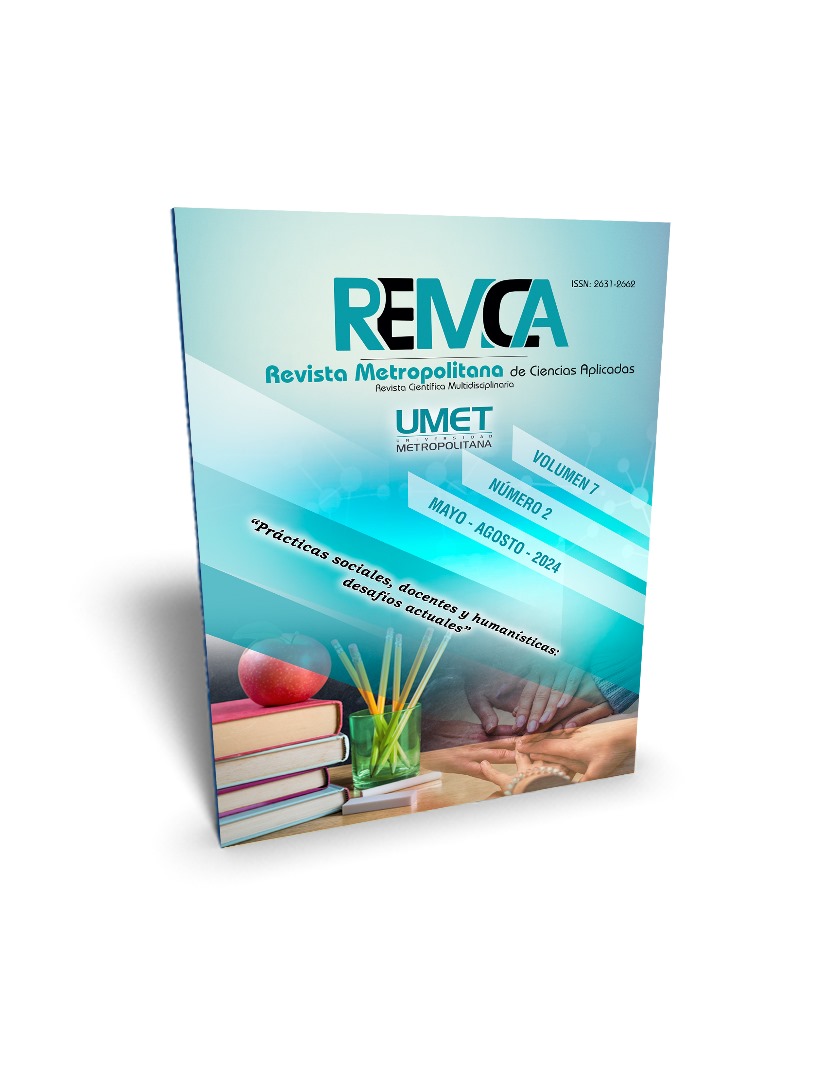Experiences of two students participating in the national competition for Physics apparatus and experiments
DOI:
https://doi.org/10.62452/g5bs9r77Keywords:
Learning, constructivism, concourse, experienceAbstract
The purpose of this study is to understand and interpret the experiences of two high school students, participants in the national physics apparatus and experiments competition throughout their educational journey; from where the motivation, systematization and deepening of knowledge is promoted in the field of the development of constructivist learning, on the knowledge developed in the participants during their activity in the contest. The data were collected through a semi-structured interview. Among the results, the experience of the participants stands out, reflecting positive attitudes towards the study of physics and the importance of promoting personal growth processes through interaction in the teaching and learning process through contests promoted by educational institutions.
Downloads
References
Almeida, J., & Almeida, B. (2016). Capacitación del profesor que entrena para los concursos de matemática en la educación media. Antenas, 3(35). https://www.redalyc.org/journal/4780/478055145004/html/
Antolín, A., Pérez, G., & Barba, J. (2012). El aprendizaje cooperativo para la mejora de la socialización y la educación a través del conflicto. Revista de Educación Física para la Paz, 7,3-11. https://dialnet.unirioja.es/servlet/articulo?codigo=3907247
Ausubel, D. P. (2002). Adquisición y retención del conocimiento. Una perspectiva cognitiva. Ed. Paidós.
Camacho, K., Calizaya, G., Buendía, A., & Reyes, R. (2023). Figuras sonoras de Chladni para el desarrollo del pensamiento abstracto en niños de 5 años. FitoVida, 2(2), 34–42. https://revistas.unid.edu.pe/index.php/FitoVida/article/view/26/26
Campbell, J. R., & Walberg, H. J. (2010). Olympiad studies: Competitions provide alternatives to developing talents that serve national interests. Roeper Review 33(1), 8-17. https://doi.org/10.1080/02783193.2011.530202
Crahay, M. (2002). Psicología de la educación. Andrés Bello.
Díaz, F., & Hernández, G. (2002). Estrategias docentes para un aprendizaje significativo. McGraw-Hill.
García, J. (2011). Modelo educativo basado en competencias: importancia y necesidad. Actualidades Investigativas en Educación, 11(3), 1-24. https://www.redalyc.org/pdf/447/44722178014.pdf
Hernández, G. (2008). Los constructivismos y sus implicaciones para la educación. Perfiles educativos, 30(122). https://www.redalyc.org/pdf/132/13211181003.pdf
Hoyos, A. (2021). Las estrategias de Aprendizaje y la Física. Boletín Científico, Prepa 4. https://www.uaeh.edu.mx/scige/boletin/prepa4/n2/e3.html
López-Barraza, LM., & Aguirre-Arias. N. (2015). Impacto del programa de concursos académicos para la enseñanza y divulgación de la ciencia, tecnología e innovación en Sinaloa (2012–2014). Espacios Públicos, 18 (42), 157-178. https://www.redalyc.org/articulo.oa?id=67639329007
Martínez, F. (2021). Aprendizaje, enseñanza, conocimiento, tres acepciones del constructivismo. Perfiles educativos, 43(174). https://doi.org/10.22201/iisue.24486167e.2021.174.60208
Meneses, J., & Caballero, C. (2017). La metodología indagatoria en educación primaria. Una mirada desde la perspectiva del aprendizaje significativo. (Ponencia). X Congreso internacional sobre investigación en didáctica de las ciencias. Sevilla, España.
Miranda, C., & Andrés, M. (2009). El aprendizaje en el laboratorio basado en resolución de problemas reales. Sapiens, 10(2). https://www.redalyc.org/articulo.oa?id=41021266010
Moinelo, M. (2022). Simulación de ondas estacionarias mediante computación paralela y software estándar de computación científica. Universidad Politécnica de Valencia.
Olave, I. & Villarreal, A. (2014). El proceso de corregulación del aprendizaje y la interacción entre pares. Revista mexicana de investigación educativa, 19(61), 377-399. https://www.scielo.org.mx/pdf/rmie/v19n61/v19n61a3.pdf
Ortiz Granja, D. (2015). El constructivismo como teoría y método de enseñanza. Sophia, Colección de Filosofía de la Educación, (19), 93-110. https://www.redalyc.org/articulo.oa?id=441846096005
Palomera Rojas, P., Martínez Galaz, C., & Carvajal Salamanca, J. (2021). Concepciones y prácticas en la enseñanza universitaria de la física: un estudio de casos en la formación inicial docente. Estudios pedagógicos (Valdivia), 47(1), 47- 69. https://dx.doi.org/10.4067/S0718-07052021000100047
Sánchez, R. (2019). El pensamiento de Vygotsky y su influencia en la educación. Latín-American Journal of Physics Education, 13(4). https://dialnet.unirioja.es/servlet/articulo?codigo=7587110
Tünnermann, C. (2011). El constructivismo y el aprendizaje de los estudiantes. UDUAL, 48, 21-32. https://www.redalyc.org/pdf/373/37319199005.pdf
Velásquez, B., Remolina N., & Calle, M. (2010). La creatividad como práctica para el desarrollo del cerebro total. Tabula Rasa, 13, 321-338. https://www.redalyc.org/pdf/396/39617525014.pdf
Vygotsky, L.S. (1985). Interacción entre enseñanza y desarrollo. Pueblo y Educación.
Wilson, J. (1992). Cómo valorar la calidad de la enseñanza. Ed. Paidós.
Downloads
Published
Issue
Section
License
Copyright (c) 2024 Víctor Felipe Benítez-Trejo, Maritza Librada Cáceres-Mesa (Autor/a)

This work is licensed under a Creative Commons Attribution-NonCommercial-ShareAlike 4.0 International License.
Authors who publish in Revista Metropolitana de Ciencias Aplicadas (REMCA), agree to the following terms:
1. Copyright
Authors retain unrestricted copyright to their work. Authors grant the journal the right of first publication. To this end, they assign the journal non-exclusive exploitation rights (reproduction, distribution, public communication, and transformation). Authors may enter into additional agreements for the non-exclusive distribution of the version of the work published in the journal, provided that acknowledgment of its initial publication in this journal is given.
© The authors.
2. License
The articles are published in the journal under the Creative Commons Attribution-NonCommercial-ShareAlike 4.0 International License (CC BY-NC-SA 4.0). The terms can be found at: https://creativecommons.org/licenses/by-nc-sa/4.0/deed.en
This license allows:
- Sharing: Copying and redistributing the material in any medium or format.
- Adapting: Remixing, transforming, and building upon the material.
Under the following terms:
- Attribution: You must give appropriate credit, provide a link to the license, and indicate if any changes were made. You may do this in any reasonable manner, but not in any way that suggests the licensor endorses or sponsors your use.
- NonCommercial: You may not use the material for commercial purposes.
- ShareAlike: If you remix, transform, or build upon the material, you must distribute your creation under the same license as the original work.
There are no additional restrictions. You may not apply legal terms or technological measures that legally restrict others from doing anything the license permits.




